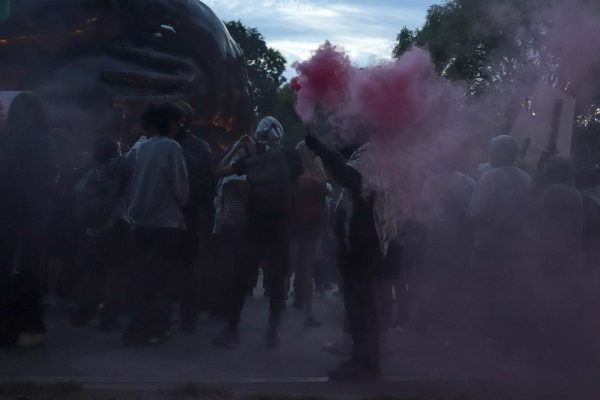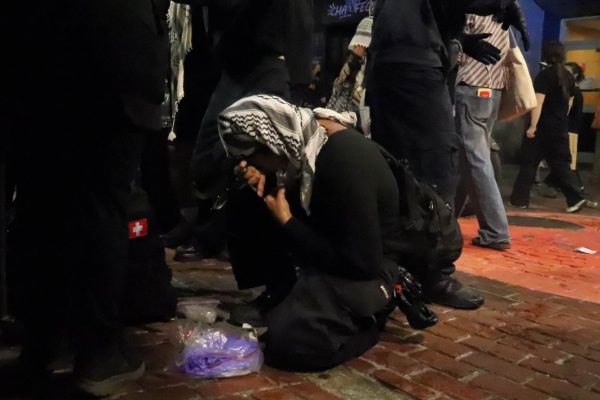Thirteen pro-Palestine protesters were arrested, and multiple police officers were injured at a Students for Justice in Palestine (SJP) protest called “Two Years of Genocide,” the Boston Police Department confirmed with The Beacon on Tuesday night. The protesters, who remain unidentified, were arrested outside the Park Street T stop as they began marching across Tremont Street at around 6:50 p.m.
Officers began arrests after protesters reached the T stop, where, according to BPD’s report, they turned on police, kicking a marked cruiser, assaulting officers, blocking traffic, and setting off flare devices emitting red smoke.
Officers attempted to use bikes to block the crowd from crossing into the street, and many protesters fell or were thrown to the ground in clashes with police, where some were later held down and zip-tied. Several police officers were seen detaining individual protesters, and Beacon reporters on the scene saw one protester with an apparent leg injury. Those detained were transported to police wagons located near Park Street Church.
Two police officers were transported to local hospitals, with preliminary reports of officers with broken bones, BPD said in their report. All of the officers’ injuries are considered non-life-threatening, police said.
The court that has jurisdiction for where the arrests occurred is the Boston Municipal Court, Edward W. Brooke Courthouse on New Chardon Street. BPD said they will be releasing information on charges, names, and ages of arrestees on Wednesday morning.
At this time, it is unclear if any Emerson students were among those arrested. This is not the first time arrests have resulted in connection with a protest action by the group Boylston SJP. In 2024, a pro-Palestine encampment in Boylston Place Alley near Emerson’s campus ended in 118 arrests.
Moments before the arrests, Boston Police officers could be seen preparing zip ties, which they used to detain protesters. Some Boston Police officers could be heard directing other police to form a blockade around the protesters. Those remaining inside the blockade were pinned down and arrested. One protester was seen being treated for pepper-spray exposure, as reported by a Beacon reporter.
Protesters could be heard screaming at police officers to get off those who were being arrested, calling police “pigs,” and telling officers to leave. At one point there was a protester on the ground in the crowd; a BPD officer was seen asking if the individual was alright to which protesters told the officer to “fuck off.” By the end of the arrests, the protesters formed a blockade by linking arms. There was a standoff between the two sides, but no further arrests were made.

The protest began at the Embrace Memorial on the Boston Common and, according to a joint Instagram post, was organized by several SJP groups across schools in Boston—both affiliated with their campuses and not— including Boylston SJP, Medford SJP, MIT, Simmons, Quinobequin Student Front For Palestine, and Eagles Against Genocide.
Members of various groups spoke at the Embrace Monument and led the crowd in chants before marching up Tremont Street. Among calls for a free Palestine, the crowd was encouraged to get involved in demanding their local communities divest from Israel by protesting universities and boycotting companies that are assumed to have economic ties to Israel. These included Tatte, Disney, and Amazon, among others. Protesters held signs with similar calls to action and also lit flares in the crowd.
Around a hundred protesters gathered around 5:45 p.m. and observed a moment of silence for lives lost in Gaza, numbering over 67,000 according to the Gaza Health Ministry by the time of Tuesday’s rally. The demonstration took place two years to the day after roughly 1,200 were killed in Israel during a surprise attack by Hamas militants on Oct. 7, 2023, which escalated military actions inside the Gaza Strip.
“I will accept blood on October 7, 2023, which is a direct confrontation of this colonial regime,” one speaker told the crowd. “[Colonialism] is violence in its natural state, and it will only deal when confronted with greater violence,” they continued.

In speeches, organizers expressed solidarity for a variety of humanitarian crises across the world and the United States, including the displacement of indigenous populations in North America and actions by the Trump administration, like the use of an immigration detention facility known as “Alligator Alcatraz.”
Referencing the monument where the crowd had gathered, a memorial honoring Rev. Dr. Martin Luther King, Jr., speakers reflected on the legacy of civil rights and peaceful protest in America.
“The state tells us to champion non-violent figures like MLK, but we know that [the state] kills them,” a speaker said.
About seven counterprotesters were present throughout most of the event, but were mostly kept around the periphery of the monument by pro-Palestine protesters who blocked recording devices with signs and keffiyehs. One of the counterprotesters told The Beacon that they felt that the protest represented support for Hamas and was disrespectful to the civilians killed on Oct. 7.
The crowd grew agitated after one counterprotester made her way inside the crowd towards the speakers. She was soon stopped and surrounded by pro-Palestine demonstrators yelling “go home, Nazi!” at her. They hooked her by the neck at one point before dragging her away by the arm. A protester eventually took the counter protester’s phone and hurled it about 30 feet away, where it landed on a concrete path encircling the monument.
After the arrests, the group, which had swelled to a couple of hundred individuals, continued marching down Winter Street toward the Downtown Crossing T stop, where they dispersed around 7:00 p.m.